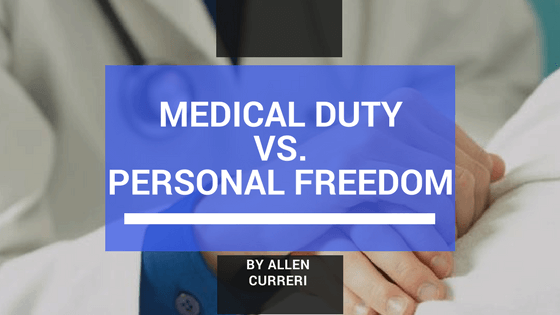What is a doctor to a patient? A tried and proven expert? A bastion of medical knowledge? Only the terminally jaded doubt the motives of most who take up our oldest, noblest professions; generally, patients see doctors as genuine purveyors of health, people who sacrifice time and energy to improve the human condition.
We’ve spent a lot of time on this site considering how doctors should make decisions. Should the final call on a human life always belong to a human mind? Should human doctors give way to programed algorithms? In order to discuss how doctors should make life-altering decisions, however, we should first consider when doctors should even be faced with a decision. When does a doctor have the right, or even duty, to employ their expertise on behalf of a patient, and to what extent is it ethical to involve patients in the decision making process itself?
In order to do our due diligence in discussing how doctors should make decisions, we also need to consider when they should make decisions, and which decisions they should make. What decisions do doctors have a right and a duty to make? How much of the decision making process is it ethical to involve patients in?
Traditional doctor-patient relations saw doctors leveraging that sense of expertise to become pivotal decision makers. In the past, doctors’ knowledge and ethos meant they were given carte blanche in deciding optimal methods of treatment; however recent decades have cultivated a paradigm shift in medical consensus, one which questions how, when and why doctors make patient-related decisions, and seeks to return full agency of choice to patients.
Widespread movements for patient empowerment bore fruit in the 60s and 70s; since then, many doctors have been trained to hold patients’ personal freedom in high esteem, leaving all but the most emergency or mundane decisions to patient preference. But, curiously enough, a University of Chicago study reveals, of 8,000 surveyed, two out of three patients prefer to exercise the freedom to defer their choice of treatment to doctors.
Snags in the issue of choice occur during severe situations where there is no such thing as a simple solution, such as whether or not a patient diagnosed with aggressive, advanced-stage cancer should undergo treatments with negligible success rates, which would significantly reduce the quality of their remaining days.
“Doctors may think ‘who am I to presume what my patients need,” says Dr. Farr Curlin, associate professor of medicine at the University of Chicago, “if a physician with all of his or her clinical experience is feeling that much uncertainty, imagine what kind of serious anxiety and confusion the patient and family may be feeling.”
Complicating the subject further is the fact that 75% of doctors would refuse harsh, often ineffective treatments such as chemotherapy treatment for themselves. In a survey by the McGill Cancer Center of 118 cancer specialists, 3 out of 4 doctors indicated that, were they diagnosed with aggressive cancer, they would rather swap solutions where guaranteed suffering meets an infinitesimal success rate for a quick passing following a few months of relative comfort and painlessness.
Regardless of whether doctors would personally agree, stripping consumers of all choice doesn’t seem feasible in any free market, let alone health care. Therefore it seems solidifying the boundaries between medical duty and patient autonomy in modern medicine could be achieved either of two ways.
The first is to hold patients’ personal freedom as sacred and absolute, in which case doctors would have to respect, as an extension of that freedom, the agency of patients who choose to leave decision making to medical experts. The second option is a mixed approach, in which doctors value patients’ ability to choose, but exert their professional opinion when they feel doing so is necessary.
Unfortunately, when dealing with critical illness, and equally critical decisions, whether one approach would benefit patients more than the other becomes a matter of perspective.
No matter who is involved in the process, it is fair to assume that outsourcing part of the patient/doctor choice to diagnostic software changes the dynamic. Will patients, or doctors, for that matter, still feel that they have a right to a nuanced opinion on their health when a computer spits out instructions?


